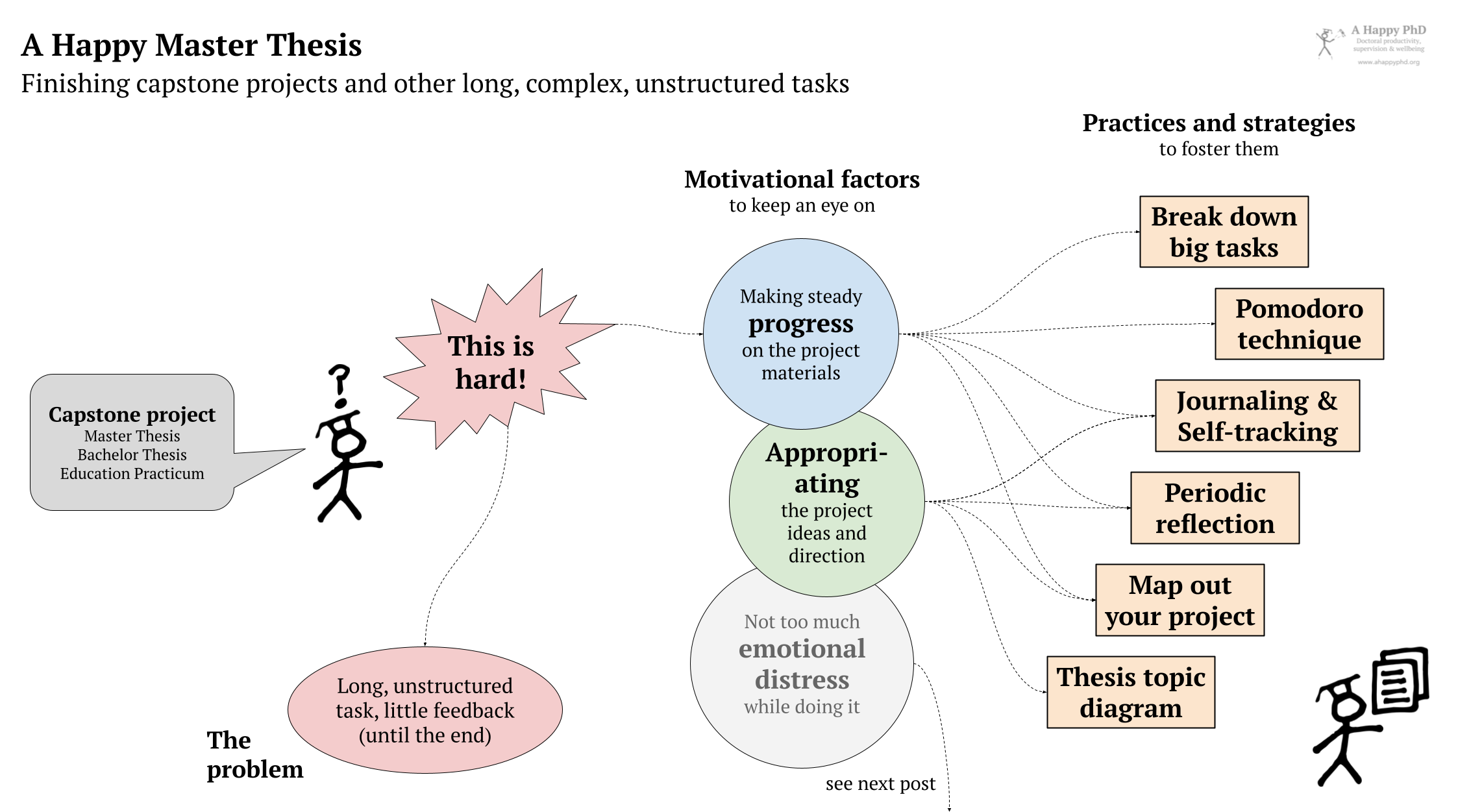POSTS
A happy Master thesis: Progress and appropriation even before the PhD
by Maria Jesus Rodriguez-Triana, Luis P. Prieto, - 7 minutes read - 1358 wordsFeelings of being stuck, of not knowing where we’re going, self-doubt, guilt… are not exclusive to the doctoral thesis journey. Despite their smaller scope, other long projects with little feedback or structure (like a master thesis) share the same motivational pitfalls and may induce the same kind of uncomfortable experience at times. In this two-part post series, we review key advice and simple practices which could also be useful to help us face these capstone projects. But these can also be very useful if you are a PhD student just starting out!
(NB: This is a bit of a different kind of post, related to an innovative pedagogy project we are doing with this blog’s long-time friend Paula Odriozola-González, about how we can apply the kind of insights and advice we normally provide to doctoral students, this time to help students finish their bachelor/master theses/practicum. Please do share it with any bachelor/master students who you think may need it!)
- “I feel like I’m stuck”
- “I don’t have the mental energy to tackle that big task, so I’ll do this small less-important one”
- “I don’t know where my project is going”
- “I don’t know where my time went, I worked a lot but I don’t feel I’m making any progress”
- “I’m just going through the motions, doing what they tell me”
- “I think I should just quit”
Multiple research studies document how the list of experiences above is very common when doing a doctorate. Our own experience suggests that this also happens quite often to students doing a bachelor or master thesis (or other big capstone projects like the practicum in Education studies). Although these capstone projects are smaller in scope and temporal scale than a doctorate (e.g., a few months vs. 3+ years), they share many characteristics, and pose similar motivational problems to students going through them: they are long, complex projects in which the student has little structure or feedback (compared with the typical higher education courses they had gone through until then). Interestingly enough, this sort of situation is not exclusive to doing a thesis: long projects with little feedback are the day-to-day life of researchers in academia and professionals in many other knowledge work areas. Thus, learning to self-regulate (our learning process, our tasks and time, and our emotions) as we try to tackle these kinds of projects is a hugely valuable skill!
The research literature on doctoral dropouts and our own research trying to help students finish this kind of projects, suggests there’s three critical motivational factors to pay attention to, as we have quite some influence over them:
- Perceiving that we are making progress towards our goal regularly (e.g., daily)
- Appropriating our thesis project (understanding it, the process needed to finish it, and feeling like we have influence over its direction)
- Not having too much emotional distress while doing the project.
How can we influence these three factors? In what sense are they under our control? Put simply: self-regulation skills can be developed through practice. By focusing on practicing simple habits and strategies that foster those three factors, we will become better at executing and completing such long complex projects. While the emotional regulation strategies (factor #3) will be covered in a separate post coming very soon, you can pick below some useful progress (factor #1) and appropriation (factor #2) strategies, whenever you are feeling a bit stuck (or even considering dropping out). Self-assess which of the three factors above is weaker in your particular situation (score them in a 1-10 scale), choose the lowest area to start with, and pick the problem that feels closer to your current struggle. NB: all the strategies are useful, but do not try to do them all at the same time, these strategies take time and effort to become habits!
- Area: Progress
- Problem: Feeling overwhelmed by a big task (e.g., planning a study, doing a literature review, writing the dissertation), not knowing where to start. Leads to procrastination and delays despite this big task’s importance, and feelings of guilt and lack of motivation.
- Solution: Break down your “big task” into smaller, more concrete and clearly doable pieces (e.g., creating a detailed outline of the section in the thesis that we are procrastinating). Then, tackling each smaller task, one at a time, will reduce procrastination impulses. Can be powerfully combined with the “Pomodoro technique” below.
- Area: Progress
- Problem: Procrastination. Feeling reluctant to jump into a long/difficult/not very appealing task, ending up postponing it.
- Solution: Choose a task you are procrastinating on, put away all distractions (e.g. your phone, email notifications, …), set a timer for 25 minutes and commit yourself to work on this task (and only this task), without interruption, until the timer rings. When the timer rings, take a break (typically, 5 minutes) and congratulate yourself for advancing in that long-procrastinated task. Repeat as many times as needed until you run out of time that day or the big scary task is completed.
- Area: Progress/Appropriation
- Problem: Despite being very busy, not knowing where the working hours went, and not perceiving much progress.
- Solution: Choose a small number of indicators that are under your control and predictive of success in your main task (e.g., time spent writing or number of written words, if you’re writing) and keep track of your daily progress (on paper, or on a spreadsheet). Moreover, keeping a diary where you verbalize what went well (or not so well) and what you learned from your actions, is sometimes cathartic.
- Area: Progress/Appropriation
- Problem: As weeks pass, feelings of being stuck (or not making much progress) even if we’ve been working on our thesis.
- Solution: Beyond planning and tracking to-dos on a daily basis, a longer term (e.g., weekly) periodic reflection will help you to keep in mind the big picture, and celebrate the minor daily accomplishments. We suggest following a particular structure of guiding questions, and doing them in written form (on paper or digitally) rather than “just thinking”, as that will make your progress more visible and traceable later on if you want to look back.
Do a thesis topic diagram (e.g., like the CQOCE diagram diagram)
- Area: Appropriation
- Problem: Not being sure what our thesis is exactly about. Having feelings that we don’t have a thesis project or any control about it (e.g., it is just something our supervisors ordered us to do).
- Solution: Having a diagram representing the main concepts and contributions of the thesis is a great reflection exercise to see if we can put into words its key ideas and inter-relations. We often suggest this diagram structure to doctoral students, but we can adapt it for the case of other theses/projects. These diagrams are a terrific tool for communicating with our supervisors and understanding whether we are on the same page about what the thesis is about and what are its main keywords, literature and novelty.
Map out your capstone journey in a diagram
- Area: Appropriation/Progress
- Problem: Not being sure what parts of the thesis are essential and which are optional, or having difficulty prioritizing different tasks. Feeling stuck in the project or unsure of whether we are going in the right direction or “going in circles”.
- Solution: A map outlining 3-4 key milestones, internal or external obstacles and crucial habits that will support us in the day-to-day of the project, will keep us focused and progressing on the important stuff (vs. procrastinating in less important tasks). These diagrams are another great tool for communicating with our supervisors and understanding expectations and key parts of the project and our process of doing it.
This is just a taste of the productivity and research advice that you can find in this blog if you are a PhD student. Yet, if you end up making all these strategies a habit in your bachelor/master thesis, you will have mastered self-regulation skills that will give you a big head start in case you continue your studies with a PhD (but also in other professional paths after the bachelors/masters).
Good luck, wherever you may go!
Header image by DALL-E.

María Jesús Rodríguez-Triana
María Jesús is an Associate Professor at Tallinn University (Estonia), researching learning technologies (especially, learning analytics). She is currently supervising (or has supervised successfully) six doctoral theses already, and she is very interested in how to support students to complete their theses.

Luis P. Prieto
Luis P. is a Ramón y Cajal research fellow at the University of Valladolid (Spain), investigating learning technologies, especially learning analytics. He is also an avid learner about doctoral education and supervision, and he's the main author at the A Happy PhD blog.
